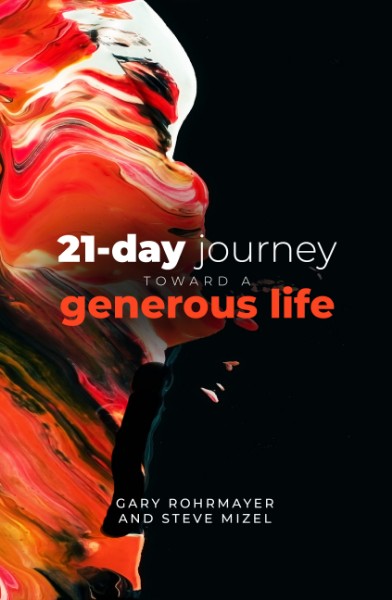21-Day Journey Toward a Generous Life
By Gary Rohrmayer & Steve Mizel
Practical Advice for Doing a 21-Day Prayer Campaign
- Devote 4 to 6 weeks to this Discipleship Initiative.
- Consider doing a Spring or Fall Capital Campaign.
- Preach a four to six week sermon series on generosity:
- Sermon #1 – Introduction to series and hand out the 21-day devotional book.
- The next three sermons can be ideas from the book to reinforce it in the lives of your people.
- Read Article – Ten Practical Steps to Creating Momentum with your team and see how you can maximize your efforts.
- Invite them to courageously pray for friends and family who are far from Jesus.
- Have them generate a list of 5 friends or family to pray for during the 21 days.
- Invite them to courageously pray for a list of church-wide prayer goals.
- Have your leadership team develop five to six prayer goals for the church for your members to pray for during the 21 days. Sample:
- Pray for a revival to breakthrough our church.
- Pray for a spiritual awakening to happen throughout our community.
- Pray for the youth outreaches or retreats or special activities.
- Pray for our pastoral staff that God would empower them (Ephesians 3:15).
- Pray for the following cities as we seek to see a new church started there to see God’s kingdom expanded.
- Pray for our missionaries that God will give them favor and effectiveness in their work (list them).
- Have your leadership team develop five to six prayer goals for the church for your members to pray for during the 21 days. Sample:
- Launch a Financial Peace University Class into the community.
- Purchase Practical Advice for doing a 21-Day Prayer Campaign in advance from Amazon’s Print on Demand Service, ask people for a donation to cover the church’s expenses ($4-5), and encourage those Amazon Kindle users to purchase directly through Amazon.
- Share your life transformation stories with us by sending us an email about all the work that God did during these 21 days.
21-Day Journey Toward a Generous Life Sermon Ideas
Text: 2 Corinthians 8:1-5
Focus: The Grace Principle
Summary: The Macedonians gave to Paul’s offering eagerly, joyfully, and generously even though they were giving out of great poverty. Paul holds them up as an example to the Corinthians to follow.
Paul was saying to the Corinthians, “Look at the Macedonians! They are rich in a way that doesn’t make sense if you don’t understand grace. They are free, bold, joyful, and secure, which frees them to give, even in poverty, from a wealth of generosity! Are you rich like this?”
If we see true wealth as money, we will be driven to keep what we have and continually try to get more. But if we see true wealth as an increased experience of grace, we will be freed to use our money for God’s glory and other’s good (without being impoverished!).
Application: Grace and greed are two different ways of looking at life. Grace frees us receive freely and give joyfully. Greed ensnares us in the darkness of entitlement and discontented fear. True wealth comes from the richness of loving and being loved. We should push against greed in our hearts to grow truly rich in generosity.
Invitation: Join us over the next 21 days as we trust God to free us from the prison of greed and into the freedom and joy of generosity. Pick up one of the 21 Day Journey toward a Generous Life books as we together, as a family of faith, seek to grow rich in the joy of grace.
Text: 2 Corinthians 8:12-15
Focus: The Fairness Principle
Summary: Paul encouraged the Corinthians to give generously according to “what they have” not according to “what they do not have.” In other words, generosity isn’t measured by how much a person gives, it’s measured by how much love motivates the gift. This, Paul says, is about “fairness.”
We don’t tend to think about charitable giving as an issue of fairness – generosity, empathy, and maybe even pity – but fairness? How can my sacrificing my resources to help someone else in need be an issue of fairness?
It will only make sense if we recognize that Paul sees us as stewards of our wealth, not owners. We have been entrusted with our talents, opportunities, and resources to be stewarded for God’s glory and the good of his people in love.
Fairness, then, isn’t an issue of equality in size of the contribution – it’s equality in the size of the sacrifice to love well. Those with small means can give joyfully from what they have knowing God will be honored even if their gifts are relatively small and will magnify the good of the gift. Those with much can give just as sacrificially knowing they can’t out-give the God who is equipping them for generosity.
Application: Like the Israelites who gathered their manna daily and couldn’t horde it (or it would be filled with rot and worms), we need to steward what God has given us with a generous heart and not seek to horde it away for our own pleasure, security, or significance. It will spoil – our hearts and our joy.
Text: 2 Corinthians 8:8-10, 9:6-11
Focus: The Growth Principle
Summary: When Jesus died and rose again, he created a new kingdom with a new economy. The economy of God’s kingdom isn’t measured in dollars, it’s measured in grace. We have been eternally enriched by his grace and in that grace have received every good thing from the God of all creation. But even though we’ve received every blessing in God’s grace, we aren’t experiencing every blessing we’ve been given.
To experience more of the riches of God’s grace, we need to grow in our responsiveness to and experience of that grace. Generosity is a critical way we respond to grace and grow in grace. When we give obediently, joyfully, and freely, we are taking a step of faith that refuses to be imprisoned by the fear of greed. We trust that the God who enriched us with “seed” will enrich us “in every way so that we can be generous in every way” by multiplying our “seed.”
Application: As we push into generosity, we step out in faith, trusting God’s faithfulness to meet us in the sacrifice. And as we do, we will discover that God’s grace is greater than anything money can buy or promise – we will grow in our experience of God’s love and will find security, significance, approval, and pleasure beyond what we could buy. As Paul said to the Corinthians, “This (giving generously) benefits you.”
Text: 2 Corinthians 8:16-9:5
Focus: The Community Principle
Summary: Paul sent a team of three noteworthy and highly trusted leaders to Corinth ahead of his visit for two purposes. The first was that he aimed “at what is honorable not only in the Lord’s sight but also in the sight of man.” He wanted the handling of the finances to be completely above board and according to the best accounting principles (with redundant accountability structures) so that he could honor God who gave him this trust and so that he could be honorable before the people who were called to trust him.
But the second thing happening here is that Paul is asking the Corinthians to invite this team in to their community to encourage them toward generosity. The Corinthians were moved by grace toward generosity but were tempted by greed to pull back from the step of faith. Titus and his faithful companions were being sent to remind them of the incredible promises of grace so that they didn’t pull back from the blessings awaiting them on the other side of generosity.
Application: We need the community of grace in order to grow in grace. We need to be encouraged to keep believing the incredible promises of God so that we can keep pushing forward into the incredible blessings of God. Generosity grows in a community that values it and everyone in that community is richer for it.
Text: 2 Corinthians 9:12-15
Focus: The Legacy Principle
Summary: Paul wraps up his appeal to the Corinthians by calling them to see the three circles of blessing that their generosity would impact: the people who received the gift, God, and the people who give. The people receiving the gift would be enriched by having their needs met and their hearts filled with gratitude. God would be enriched by the overflowing praise of his glory as our gift to them awakened within them a fresh experience of his grace. And we, ourselves, were enriched by a surpassing experience of grace as we grow in our obedience to the gospel’s call to love!
When Jesus rose from the dead, it was like God threw a rock into a still pond. The ripples of that incredible act of love are still going out. When we receive that love and then move to share that love with others in practical ways, we are creating new ripples that impact others with love, and keep creating new ripples we may never even see (though God does). This produces a true legacy of love. God started it and we get to continue it by simply receiving grace and moving out in generosity!
Application: When we give, we don’t just meet a temporal need. We create ripples of love that will keep going even into the eternal kingdom of Christ. Of all the things we do in this world, leaving a legacy of love is the most lasting and powerful thing we can do.


